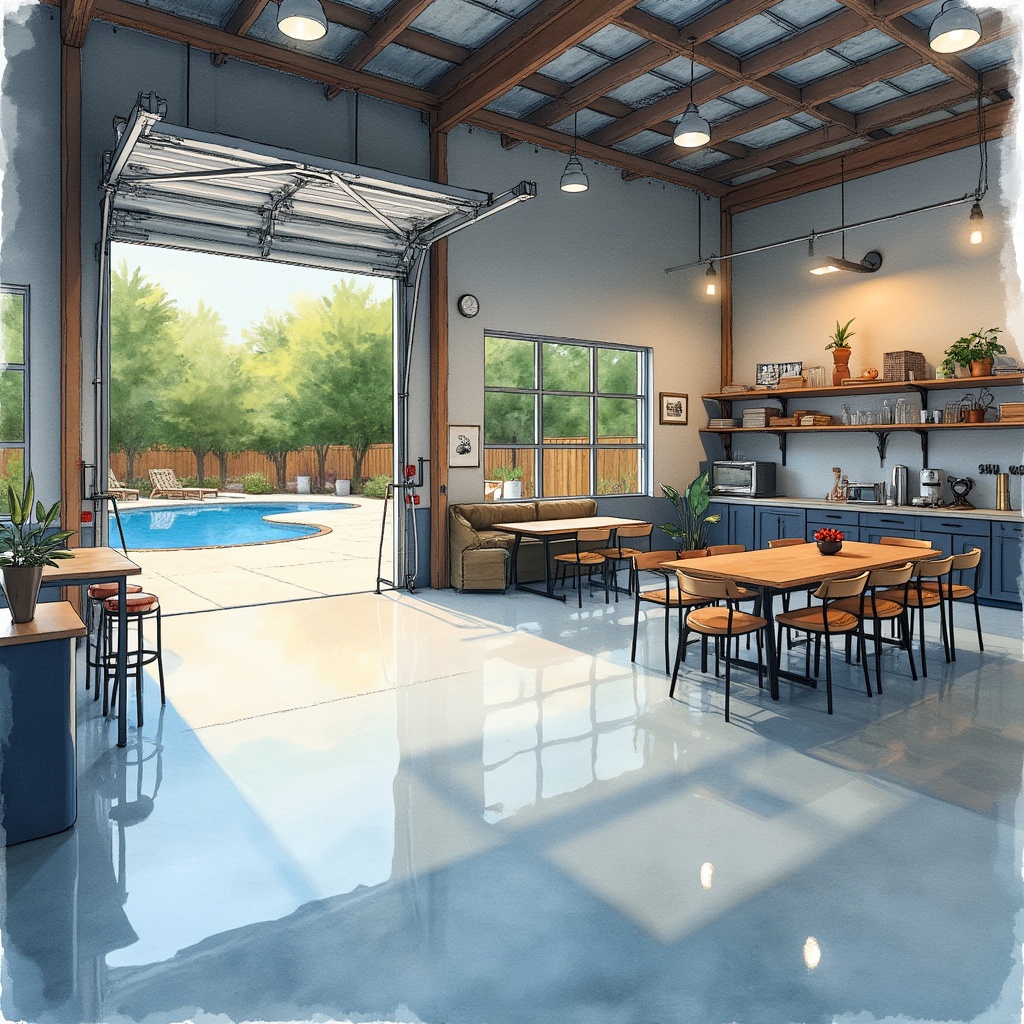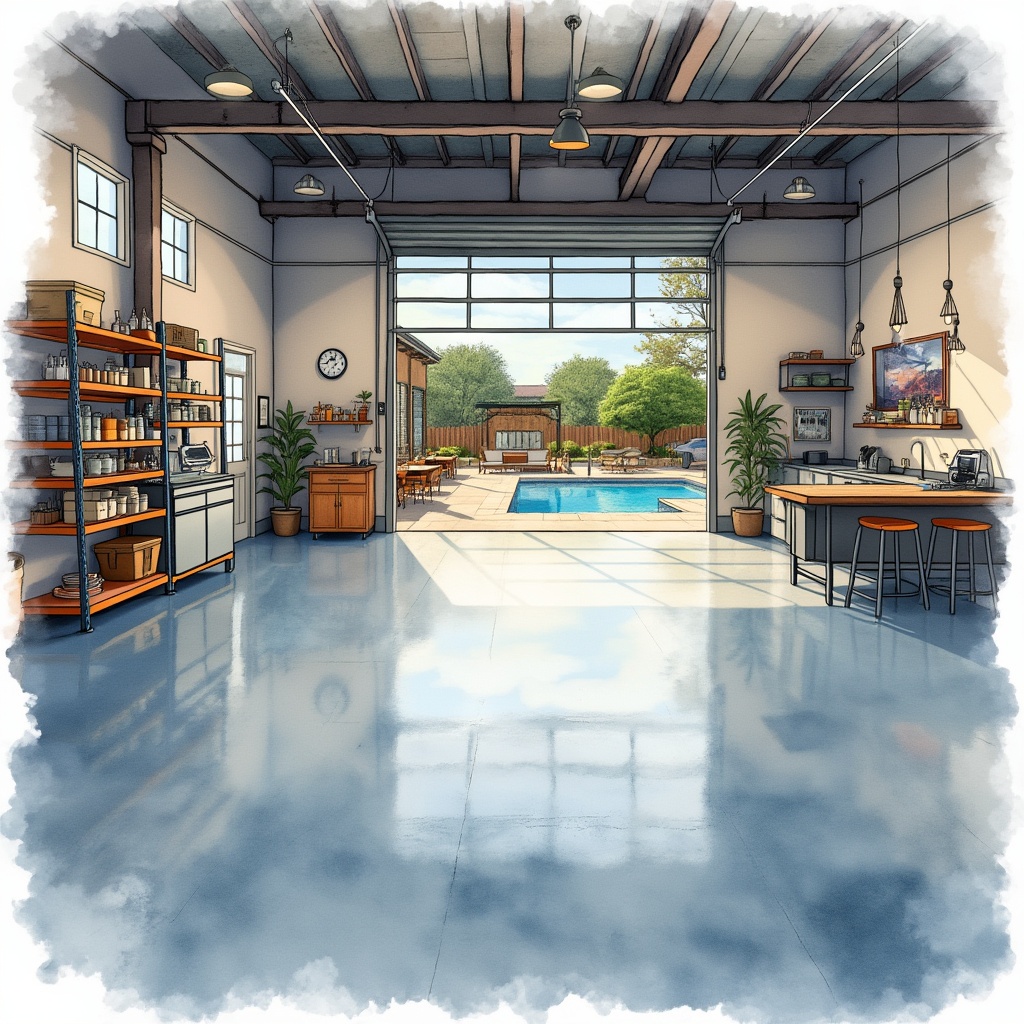
Industrial flooring solutions in the Dallas-Ft Worth metro area encompass a range of coatings designed to enhance longevity and functionality for commercial and industrial spaces. Concrete surface preparation plays a foundational role in these applications, often involving the installation of a moisture vapor barrier to reduce the risk of substrate failure.
Polyurethane coatings are valued for their excellent chemical resistance, making them suitable for environments such as repair shops and manufacturing plants.
Decorative floor coatings not only improve visual appeal but also increase slip resistance, which is important for locations like restaurant kitchens and garage floors.
Pricing for polyurea and polyaspartic floor systems typically ranges from $3 to $12 per square foot, based on factors such as floor condition, coating type, and project size. The fast curing times associated with polyurea solutions minimize downtime, an advantage for warehouses that require continuous operation.
Click here to learn more about: ntxepoxy.com
Industrial flooring solutions for warehouses
Dallas-Ft Worth warehouses frequently require flooring that integrates chemical-resistant floors engineered to endure the rigors of heavy equipment operation and persistent foot traffic. Epoxy, polyurea, and polyaspartic coatings installed by specialized contractors offer fast-curing epoxy solutions, reducing downtime through accelerated curing times compared to standard flooring options.
Incorporating slip-resistant surfaces minimizes accident risks involving forklifts and pallet jacks, which are common in industrial settings.
These facilities often utilize seamless floor systems that provide high structural integrity, protecting underlying concrete from mechanical and chemical wear.
Polyurea’s notable moisture tolerance allows installation over damp substrates, an advantage in variable Texan climate conditions. Several warehouses also opt for high-gloss finish coatings to increase light reflectivity, thereby improving visibility and decreasing electricity consumption in extensive storage areas, while contractor pricing for such installations in the Dallas-Ft Worth metroplex typically falls within competitive ranges depending on floor size and required specifications.

Concrete surface preparation essentials
Successful application of epoxy, polyurea, and polyaspartic coatings relies heavily on precise surface conditioning before installation services commence. Durable sealant performance often requires establishing a specific surface texture known as the concrete surface profile (CSP), commonly achieved through mechanical techniques such as diamond grinding or shot blasting.
Oil residues, curing compounds, and other contaminants must be thoroughly removed to reduce the risk of coating failure, particularly when addressing floor crack repair in residential garages or commercial kitchens.
Corrosion protection measures improve longevity for outdoor patios and swimming pool decks subjected to frequent moisture and chemical exposure.
Unique environmental considerations within the Dallas-Ft Worth metroplex, including seasonal humidity fluctuations, influence surface absorption rates and timing for contractors, which may affect epoxy flooring contractor cost and price range estimates for both business and industrial projects.
Surface Preparation and Coatings
- Concrete surface profile (CSP) is essential for durable sealant performance and is typically created using diamond grinding or shot blasting.
- Removing oil residues, curing compounds, and other contaminants is crucial to prevent coating failure, especially in floor crack repairs for garages and commercial kitchens.
- Corrosion protection extends the lifespan of outdoor patios and swimming pool decks exposed to moisture and chemicals.
- Seasonal humidity changes in the Dallas-Ft Worth area affect surface absorption and timing, impacting epoxy flooring contractor costs for business and industrial projects.
How does moisture vapor barrier improve floors?
Concrete slabs beneath epoxy, polyurea, and polyaspartic flooring systems often require moisture mitigation measures to maintain durability over time. Installing a vapor barrier reduces water vapor transmission from the ground, which can cause issues such as coating bubbling, adhesive failure, and delamination, especially in environments like repair shops, garages, and basements within the Dallas-Ft Worth metro area.
Surface grinding prepares the slab surface by creating a profile that improves bond strength between the vapor barrier and concrete, optimizing overall adhesion.
Outdoor applications, including patio resurfacing and pool deck protection, benefit from controlling moisture fluctuations caused by Texas’s high humidity, resulting in longer-lasting floor coatings.
Pricing for these installation services varies depending on slab condition, selected barrier type, and project scope; experienced epoxy flooring contractors provide detailed estimates to address specific residential, commercial, or industrial needs. These preventative layers ultimately support enhanced performance and lifespan of decorative and protective coatings across various flooring types.
Benefits of decorative floor coatings in commercial spaces
Epoxy flooring contractors serving the Dallas-Ft Worth metro area frequently recommend decorative floor coatings due to their notable abrasion resistance, which is especially beneficial in commercial environments such as repair shops and restaurants where heavy foot and equipment traffic occur.
Basement moisture control properties inherent in these coatings prevent structural damage and extend the lifespan of subflooring below surface finishes.
Coatings featuring a polyaspartic topcoat provide excellent UV resistance, helping maintain aesthetic appeal on outdoor patios and swimming pool decks exposed to intense sunlight.
Certain industrial settings demand antistatic flooring options, which effectively minimize static discharge, enhancing safety for sensitive equipment.
These applications offer a well-rounded combination of functional performance and visual enhancement, allowing businesses to balance installation costs with long-term durability, hygiene, and safety requirements.
Choosing seamless floor systems for durability
Durable floor installations benefit from eliminating joints, which significantly reduces moisture mitigation challenges common in Dallas-Ft Worth environments. Epoxy coatings deliver strong chemical resistance but often involve longer curing periods, making them ideal for repair shops and industrial spaces requiring robust protection.
Polyurea offers rapid curing times alongside superior UV resistance, which suits outdoor resurfacing applications such as patios and swimming pool decks.
Polyaspartic flooring maintains flexibility amid temperature fluctuations, minimizing crack formation in high-traffic residential areas like garages and basements.
Proper substrate preparation, including the use of concrete densifiers, plays an important role in preventing delamination caused by humidity variations typical to the region. These seamless floor options contribute to hygienic surfaces by inhibiting microbial growth, which is particularly advantageous for restaurants and commercial kitchens.
Balancing cost considerations with environmental exposure and functional needs allows for selecting a system that ensures long-lasting performance across homes, businesses, and industrial spaces within the Dallas-Ft Worth metro area.
Cost factors in epoxy flooring contractor services
Surface preparation plays a significant role in determining the price of installing resilient floor coatings throughout the Dallas-Ft Worth metroplex. Concrete floors exhibiting cracks or unevenness often require grinding or patching before applying industrialgrade epoxy, increasing labor time and expenses.
Moisture vapor tests performed prior to application influence the choice of materials, particularly when foodgrade epoxy must meet health code requirements for restaurant kitchens.
The thickness and chemical composition of the coating, including formulations with polyurea blends, impact curing duration and overall durability, which in turn affects contractor fees.
Incorporating nonslip textures or custom color flake finishes elevates both material costs and installation complexity. Expansive projects such as automotive shop flooring benefit from discounted rates per square foot, yet logistical factors like site accessibility may raise total pricing.
Such variables collectively shape the investment needed for seamless floor systems designed for residential, commercial, and industrial environments.
Resilient Floor Coatings Installation
- Concrete floors with cracks or uneven surfaces require grinding or patching, increasing labor time and costs.
- Moisture vapor tests determine material selection, especially for foodgrade epoxy in restaurant kitchens.
- Coating thickness and chemical composition affect curing time, durability, and contractor fees.
- Adding nonslip textures or custom color flakes raises material costs and installation complexity.
Advantages of polyaspartic topcoat applications
Industrial environments benefit from coatings that cure rapidly, enabling surfaces to return to service with minimal downtime. Rapid cure polyurea technology facilitates such quick turnaround times, making these coatings ideal for settings like warehouses and repair shops where operational continuity is paramount.
• Impact resistance supports durability under heavy foot and machinery traffic, which is particularly important for garage floors and commercial basements in the Dallas-Ft Worth metro area.
• Thermal shock resistance helps maintain structural integrity on outdoor patios and swimming pool decks that experience frequent temperature changes common to Texas climates.
• Chemical spill containment capabilities reduce damage risks on restaurant and industrial floors exposed to oils, solvents, and cleaning agents, thereby decreasing maintenance frequency.
• These properties collectively contribute to longer service life, lowering total expenses associated with routine repairs and replacements.
Such protective qualities make these systems a practical choice for homes, businesses, and industrial settings, especially when considering the cost variables encountered during epoxy flooring contractor services.
Effective coatings minimize interruptions and enhance investment value without compromising performance.
Repairing floor cracks with abrasion resistance
Floor surface damage in both commercial and residential environments often requires specialized methods to restore durability and appearance. Mechanical abrasion techniques serve to eliminate dirt, oils, and weak concrete layers, improving the bond strength of high-performance coatings applied during restoration.
Epoxy mortar systems are widely selected for crack filling due to their excellent chemical resistance and ability to withstand significant wear, particularly in settings such as repair shops, garage floors, and basements.
Industrial resurfacing approaches typically involve multiple layers of protective materials that enhance abrasion resistance, which increases the longevity of floors exposed to heavy foot and vehicle traffic.
The combination of these treatments with commercial concrete polishing not only smooths the surface but also reinforces the repaired zones against future deterioration. Locally, Dallas-Ft Worth contractors specializing in epoxy, polyurea, and polyaspartic floor installations offer tailored solutions with cost ranges typically between $3 and $12 per square foot, depending on the extent of crack repair and finish required.
Patio resurfacing and pool deck protection options
Concrete surfaces surrounding residential and commercial properties within the Dallas-Ft Worth metroplex benefit from specialized coatings designed for moisture tolerance. Moisture tolerant epoxy layers help mitigate humidity-induced deterioration, which is particularly relevant for outdoor patios and pool decks exposed to seasonal weather shifts.
Polyurea coatings, favored by flooring contractors, cure swiftly to minimize downtime during installation, allowing seamless project completion even under fluctuating conditions.
Polyaspartic materials create scratchresistant surfaces that endure chemical exposure while preserving aesthetic quality, making them suitable for environments such as restaurant patios and repair shops.
Proper preparation techniques, including diamond grinding of substrate floors, improve adhesion and extend the coating warranty, thereby supporting long-term durability. Elastomeric coatings add flexible wear layers that adapt to structural movements without cracking or delamination, enhancing longevity.
Cost estimates for professional installation of these coatings typically range based on surface size and complexity, with residential projects often falling between $3 to $12 per square foot depending on material choice and contractor expertise.
UV resistant coatings and long-lasting finish benefits
Protective surface treatments designed for floors in the Dallas-Ft Worth metroplex help preserve material integrity by blocking solar radiation that causes color fading and surface breakdown.
Polyurea membranes, favored for industrial restoration, offer enhanced resistance through specialized chemical structures that surpass conventional epoxy flooring contractors’ solutions in durability and UV resilience.
These durable finishes commonly employed in repair shops, restaurant kitchens, and garage floors mitigate wear from thermal cycling, chemical exposure, and mechanical abrasion, leading to lower maintenance frequency and overall cost savings.
Using ecofriendly epoxy blends on outdoor patios and pool decks further supports longevity while reducing environmental impact, making them a practical choice for residential and commercial applications.
Commercial deck coatings with decorative metallic epoxy not only maintain aesthetic clarity despite prolonged Texas sunlight exposure but also contribute to surface hardness and color stability essential for high-traffic areas.
